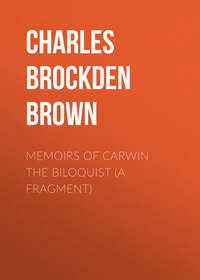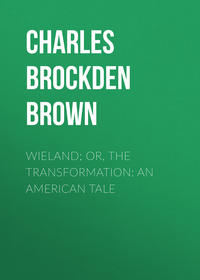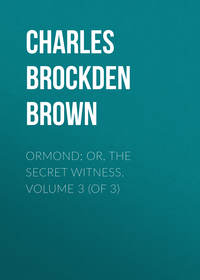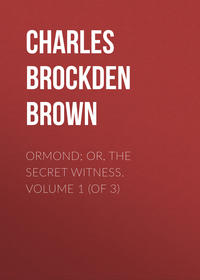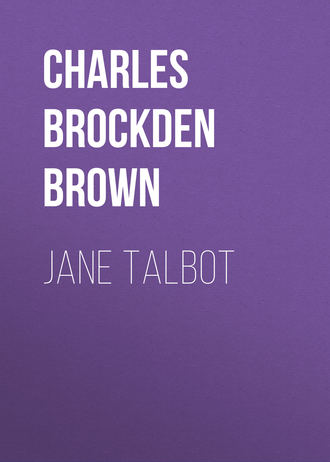 полная версия
полная версияJane Talbot
I was, for a time, at a loss for words to express my surprise and indignation at my brother's unfeeling selfishness. I could no longer maintain my usual silence on his conduct, but inveighed against it, as soon as I could find breath, with the utmost acrimony.
My father was embarrassed, confounded, grieved. He sighed, and even wept.–"Francis," said he, at last, "to-be-sure, has not acted quite right. Bat what can be done? Is he not my child? and, if he has faults, is he altogether without virtue? No; if he did not find a lenient and forgiving judge in me, his father, in whom could he look for one? Besides, the thing is done, and therefore without remedy. This year's income is nearly exhausted, and I really fear, before another quarter comes round, I shall want myself."
I again described, in as strong and affecting terms as I could, Risberg's expectations and disappointment, and insinuated to him, that, in a case like this, there could be no impropriety in selling a few shares of his bank-stock.
This hint was extremely displeasing, but I urged him so vehemently that he said, "Francis will perhaps consent to it; I will try him this evening."
"Alas!" said I, "my brother will never consent to such a measure. If he has found occasion for the money you had designed for my poor cousin, and of all your current income, his necessities will not fail to lay hold of this."
"Very true;" (glad, it seemed, of an excuse for not thwarting his son's will;) "Frank will never consent. So, you see, it will be impossible to do any thing."
I was going to propose that he should execute this business without my brother's knowledge, but instantly perceived the impossibility of that. My father had for some years devolved on his son the management of all his affairs, and habit had made him no longer qualified to act for himself. Frank's opinion of what was proper to be done was infallible, and absolute in all cases.
I returned home with a very sad heart. I was deeply afflicted with this new instance of my brother's selfishness and of my father's infatuation. "Poor Risberg!" said I; "what will become of thee? I love thee as my brother. I feel for thy distresses. Would to Heaven I could remove them! And cannot I remove them? As to contending with my brother's haughtiness in thy favour, that is a hopeless task. As to my father, he will never submit to my guidance."
After much fruitless meditation, it occurred to me that I might supply Risberg's wants from my own purse. My mother's indulgence to me was without bounds. She openly considered and represented me as the heiress of her fortunes, and confided fully in my discretion. The chief uses I had hitherto found for money were charitable ones. I was her almoner. To stand in the place of my father with respect to Risberg, and supply his customary stipend from my own purse, was an adventurous undertaking for a young creature like me. It was impossible to do this clandestinely; at least, without the knowledge and consent of Mrs. Fielder. I therefore resolved to declare what had happened, and request her counsel. An opportunity suitable to this did not immediately offer.
Next morning, as I was sitting alone in the parlour, at work, my brother came in. Never before had I received a visit from him. My surprise, therefore, was not small. I started up with the confusion of a stranger, and requested him, very formally, to be seated.
I instantly saw in his looks marks of displeasure, and, though unconscious of meriting it, my trepidation increased. He took a seat without speaking, and after some pause addressed me thus:–
"So, girl, I hear that you have been meddling with things that do not concern you,–sowing dissension between the old man and me; presuming to dictate to us how we are to manage our own property. He retailed to me, last night, a parcel of impertinence with which you had been teasing him, about this traveller Risberg, assuming, long before your time, the province of his care-taker. Why, do you think," continued he, contemptuously, "he'll ever return to marry you? Take my word for't, he's no such fool. I know that he never will."
The infirmity of my temper has been a subject of eternal regret to me; yet it never displayed itself with much force, except under the lash of my brother's sarcasms. My indignation on those occasions had a strange mixture of fear in it, and both together suffocated my speech. I made no answer to this boisterous arrogance.
"But come,' continued he, "pray, let us hear your very wise objections to a man's applying his own property to his own use. To rob himself and spend the spoil upon another is thy sage maxim, it seems, for which thou deservest to be dubbed a she Solomon. But let's see if thou art as cunning in defending as in coining maxims. Come; there is a chair: lay it on the floor, and suppose it a bar or rostrum, which thou wilt, and stand behind it, and plead the cause of foolish prodigality against common sense."
I endeavoured to muster up a little spirit, and replied, "I could not plead before a more favourable judge. An appeal to my brother on behalf of foolish prodigality could hardly fail of success. Poor common sense must look for justice at some other tribunal."
His eyes darted fire. "Come, girl; none of your insolence. I did not come here to be insulted."
"No; you rather came to commit than to receive an insult."
"Paltry distinguisher! to jest with you, and not chide you for your folly, is to insult you, is it? Leave off romance, and stick to common sense, and you will never receive any thing but kindness from me. But come; if I must humour you, let me hear how you have found yourself out to be wiser than your father and brother."
"I do not imagine, brother, that any good will result from our discussing this subject. Education, or sex, if you please, has made a difference in our judgments, which argument will never reconcile."
"With all my heart. A truce everlasting let there be; but, in truth, I merely came to caution you against inter-meddling in my affairs, to tell you to beware of sowing jealousy and ill-will between the old man and me. Prate away on other subjects as much as you please; but on this affair of Risberg's hold your tongue for the future."
"I thank you for your brotherly advice, but I am afraid I never shall bring myself to part with the liberty of prating on every subject that pleases me; at least, my forbearance will flow from my own discretion, and not from the imperious prohibition of another."
He laughed. "Well said, oddity. I am not displeased to see you act with some spirit: but I repeat my charge; be quiet. Your interference will do no good."
"Indeed, I firmly believe that it will not; and that will be a motive for my silence that shall always have its due weight with me. Risberg, I see, must look elsewhere for a father and a brother."
"Poor thing! do; put its finger in its eye and weep. Ha! ha! ha! poor Risberg! how would he laugh to see these compassionate tears! It seem she has written in a very doleful strain to thee,–talked very pathetically about his debts to his laundress and his landlady. I have a good mind to leave thee in this amiable ignorance; but I'll prove for once a kind brother, by telling you that Risberg is a profligate and prodigal; that he neglects every study but that of dice; that this is the true reason why I have stood in the way of the old man's bounty to him. I have unquestionable proof of his worthlessness, and see no reason to throw away money upon London prostitutes and gamblers. I never mentioned this to the old man, because I would not needlessly distress him, for I know he loves Jack at least as well as his own children. I tell it you to justify my conduct, and hope that I may for once trust to your good sense not to disclose it to your father."
My heart could not restrain its indignation at these words.
"'Tis false!" I exclaimed; "'tis a horrid calumny against one who cannot defend himself! I will never believe the depravity of my absent brother, till I have as good proof of it as my present brother has given me of his."
"Bravo, my girl! who could have thought you could give the lie with such a grace? Why don't you spit in the face of the vile calumniator? But I am not angry with you, Jane; I only pity you; yet I'll not leave you before I tell you my mind. I have no doubt Risberg means to return. He knows on what footing you are with Mrs. Fielder, and will take care to return; but, mind me, Jane, you shall never throw yourself and your fortune away upon Risberg, while I have a voice or an arm to prevent it. And now–good-by to you."
So ended this conversation. He left me in a hurry and confusion of spirits not to be described. For a time I felt nothing but indignation and abhorrence for what I thought a wicked and cruel calumny; but in proportion as I regained my tranquillity, my reflections changed. Did not my brother speak truth? Was there not something in his manner very different from that of an impostor? How unmoved was he by the doubts which I ventured to insinuate of his truth! Alas! I fear 'tis too true.
I told you before that we parted at an age when love could not be supposed to exist between us. If I know myself, I felt no more for him than for a mere brother; but then I felt all the solicitude and tenderness of a sister. I knew not scarcely how to act in my present situation; but at length determined to disclose the whole affair to my mother. With her approbation I enclosed an order on a London merchant in a letter to this effect:–
"I read your letter, my friend, with the sentiments of one who is anxious for your happiness. The difficulties you describe will, I am afraid, be hereafter prevented only by your own industry. My father's and brother's expenses consume the whole of that income in which you have hitherto had a share, and I am obliged to apprize you that the usual remittances will no longer be made. You are now advancing to manhood, and, I hope, will soon be able to subsist upon the fruits of your own learning and industry.
"I have something more to say to you, which I scarcely know how to communicate. Somebody here has loaded your character with very heavy imputations. You are said to be addicted to gaming, sensuality, and the lowest vices. How much grief this intelligence has given to all who love you, you will easily imagine. To find you innocent of these charges would free my heart from the keenest solicitude it has hitherto felt. I leave to you the proper means of doing this, if you can do it without violation of truth.
"I am very imperfectly acquainted with your present views. You originally designed, after having completed your academical and legal education, to return to America. If this should still be your intention, the enclosed will obviate some of your pecuniary embarrassments, and my mother enjoins me to tell you that, as you may need a few months longer to make the necessary preparations for returning, you may draw on her for an additional sum of five hundred dollars. Adieu."
My relation to Risberg was peculiarly delicate. His more lively imagination had deceived him already into a belief that he was in love. At least, in all his letters, he seemed fond of recognising that engagement which my father had established between us, and exaggerated the importance, to his happiness, of my regard. Experience had already taught me to set their just value on such professions. I knew that men are sanguine and confident, and that the imaginary gracefulness of passion naturally prompts them to make their words outstrip their feelings. Though eager in their present course, it is easy to divert them from it; and most men of an ardent temper can be dying of love for half a dozen different women in the course of a year.
Women feel deeply, but boast not. The supposed indecency of forwardness makes their words generally fall short of their sentiments, and passion, when once thoroughly imbibed, is as hard to be escaped from as it was difficultly acquired. I felt no passion, and endeavoured not to feel any, for Risberg, till circumstances should make it proper and discreet. My attachment was to his interest, his happiness, and not to his person, and to convince him of this was extremely difficult. To persuade him that his freedom was absolute and entire, that no tie of honour or compassion bound him to me, but that, on the contrary, to dispose of his affections elsewhere would probably be most conducive to the interests of both.
These cautious proceedings were extremely unpleasing to my cousin, who pretended to be deeply mortified at any thing betokening indifference, and terribly alarmed at the possibility of losing me. On the whole, I confess to you, that I thought my cousin and I were destined for each other, and felt myself, if I may so speak, not in love with him, but prepared, at the bidding of discretion, to love him.
My brother's report, therefore, greatly distressed me. Should my cousin prove a reprobate, no power on earth should compel me to be his. If his character should prove blameless, and my heart raise no obstacles, at a proper time I should act with absolute independence of my brother's inclinations. The menace that while he had voice or arm he would hinder my choice of Risberg made the less impression as it related to an event necessarily distant, and which probably might never happen.
The next letter from Risberg put an end to all further intercourse between us. It informed us of his being on the eve of marriage into an opulent family. It expressed much indignation at the calumny which had prevailed with my father to withdraw his protection; declared that he deemed himself by no means equitably or respectfully treated by him; expressed gratitude to my mother for the supply she had remitted, which had arrived very seasonably and prevented him from stooping to humiliations which might have injured his present happy prospects; and promised to repay the sum as soon as possible. This promise was punctually performed, and Risberg assured me that he was as happy as a lovely and rich wife could make him.
I was satisfied with this result, and bestowed no further thought on that subject. From morn to midnight have I written, and have got but little way in my story. Adieu.
Letter IV
To Henry ColdenWednesday Morning, October 5.
I continued my visits to my father as usual. Affairs proceeded nearly in their old channel. Frank and I never met but by accident, and our interviews began and ended merely with a good-morrow. I never mentioned Risberg's name to my father, and observed that he as studiously avoided lighting on the same topic.
One day a friend chanced to mention the greatness of my fortune, and congratulated me on my title to two such large patrimonies as those of Mrs. Fielder and my father. I was far from viewing my condition in the same light with my friend. My mother's fortune was indeed large and permanent, but my claim to it was merely through her voluntary favour, of which a thousand accidents might bereave me. As to my father's property, Frank had taken care very early to suggest to him that I was amply provided for in Mrs. Fielder's good graces, and that it was equitable to bequeath the whole inheritance to him. This disposition, indeed, was not made without my knowledge; but though I was sensible that I held of my maternal friend but a very precarious tenure, that my character and education were likely to secure a much wiser and more useful application of money than my brother's habits, it was impossible for me openly to object to this arrangement; so that, as things stood, though the world, in estimating my merits, never forgot that my father was rich, and that Frank and I were his only children, I had in reality no prospect of inheriting a farthing from him.
Indeed, I always entertained a presentiment that I should one day be poor, and have to rely for subsistence on my own labour. With this persuasion, I frequently busied my thoughts in imagining the most lucrative and decent means of employing my ingenuity, and directed my inquiries to many things of little or no use but on the irksome supposition that I should one day live by my own labour. But this is a digression.
In answer to my friend's remarks, I observed that my father's property was much less considerable than some people imagined; that time made no accession to it; and that my brother's well-known habits were likely to reduce it much below its present standard, long before it would come to a division.
"There, Jane, you are mistaken," said my friend, "or rather you are willing to mislead me; for you must know that, though your father appears to be idle, yet your brother is speculating with his money at an enormous rate."
"And pray," said I, (for I did not wish to betray all the surprise that this intelligence gave me,) "in what speculations is he engaged?"
"How should I tell you, who scarcely know the meaning of the word? I only heard my father say that young Talbot, though seemingly swallowed up in pleasure, knew how to turn a penny as well as another, and was employing his father's wealth in speculation; that, I remember, was his word, but I never, for my part, took the trouble to inquire what speculation meant. I know only that it is some hazardous or complicated way of getting money."
These hints, though the conversation passed immediately to other subjects, made a deep impression on my mind. My brother's character I knew to be incompatible with any sort of industry, and had various reasons for believing my father's property to be locked up in bank-stock. If my friend's story were true, there was a new instance of the influence which Frank had acquired over his father. I had very indistinct ideas of speculation, but was used to regard it as something very hazardous, and almost criminal.
I told my mother all my uneasiness. She thought it worth while to take some means of getting at the truth, in conversation with my father. Agreeably to her advice, on my next visit I opened the subject, by repeating exactly what I heard, I concluded by asking if it were true.
"Why, yes," said he; "it is partly true, I must confess. Some time ago Frank laid his projects before me, and they appeared so promising and certain of success, that I ventured to give him possession of a large sum."
"And what scheme, sir, was it, if I may venture to ask?"
"Why, child, these are subjects so much out of thy way, that thou wouldst hardly comprehend any explanation that I could give."
"Perhaps so; but what success, dear sir, have you met with?"
"Why, I can't but say that affairs have not been quite as expeditious in their progress as I had reason, at first, to expect. Unlooked-for delays and impediments will occur in the prosecution of the best schemes; and these, I must own, have been well enough accounted for."
"But, dear sir, the scheme, I doubt not, was very beneficial that induced you to hazard your whole fortune. I thought you had absolutely withdrawn yourself from all the hazards and solicitudes of business."
"Why, indeed, I had so, and should never have engaged again in them of my own accord. Indeed, I trouble not myself with any details at present. I am just as much at my ease as I used to be. I leave every thing to Frank."
"But, sir, the hazard, the uncertainty, of all projects! Would you expose yourself at this time of life to the possibility of being reduced to distress? And had you not enough already?"
"Why, what you say, Jane, is very true: these things did occur to me, and they strongly disinclined me, at first, from your brother's proposals; but, I don't know how it was, he made out the thing to be so very advantageous; the success of it so infallible; and his own wants were so numerous that my whole income was insufficient to supply them; the Lord knows how it has happened. In my time, I could live upon a little. Even with a wife and family, my needs did not require a fourth of the sum that Frank, without wife or child, contrives to spend; yet I can't object neither. He makes it out that he spends no more than his rank in life, as he calls it, indispensably requires. Rather than encroach upon my funds, and the prospects of success being so very flattering, and Frank so very urgent and so very sanguine, whose own interest it is to be sure of his footing, I even, at last, consented."
"But I hope, dear sir, your prudence provided in some degree against the possibility of failure. No doubt you reserved something which might serve as a stay to your old age in case this hopeful project miscarried. Absolutely to hazard all on the faith of any project whatever was unworthy of one of your experience and discretion."
My father, Henry, was a good man,–humane, affectionate, kind, and of strict integrity; but I scarcely need to add, after what I have already related, that his understanding was far from being vigorous, or his temper firm. His foibles, indeed, acquired strength as he advanced in years, while his kindness and benevolence remained undiminished.
His acquiescence in my brother's schemes can hardly be ranked with follies: you, who know what scheme it was, who know the intoxicating influence of a specious project, and, especially, the wonderful address and plausibility of Catling, the adventurer who was my brother's prime minister and chief agent in that ruinous transaction, will not consider their adopting the phantom as any proof of the folly of either father or son. But let me return. To my compliment to his experience and discretion, my father replied, "Why, truly, I hardly know how it may turn out in the long run. At first, indeed, I only consented to come down with a few thousands, the total loss of which would not break my heart; but this, it seems, though it was all they at first demanded, did not prove quite sufficient. Some debts they were obliged to contract,–to no great amount, indeed,–and these must be paid or the scheme relinquished. Having gone so far into the scheme, it was absurd to let a trifle stop me. I must own, had I foreseen all the demands that have been made from time to time, I should never have engaged in it; but I have been led on from one step to another, till I fear it would avail me nothing to hesitate or hold back; and Frank's representations are so very plausible!"
"Does your whole subsistence, then, my dear sir, depend on the success of this scheme? Suppose it should utterly fail: what will be the consequences to yourself?"
"Fail! That is impossible. It cannot fail but through want of money, and I am solemnly assured that no more will be necessary."
"But how often, sir, has this assurance been given? No doubt with as much solemnity the first time as the last."
My father began to grow impatient:–"It is useless, Jane, to start difficulties and objections now. It is too late to go. back, even if I were disinclined to go forward; and I have no doubt of ultimate success. Be a good girl, and you shall come in for a share of the profit. Mrs. Fielder and I, between us, will make you the richest heiress in America. Let that consideration reconcile you to the scheme."
I could not but smile at this argument. I well knew that my brother's rapacity was not to be satisfied with millions. To sit down and say, "I have enough,' was utterly incompatible with his character. I dropped the conversation for the present.
My thoughts were full of uneasiness. The mere sound of the word "project" alarmed me. I had little desire of knowing the exact nature of the scheme, being nowise qualified to judge of its practicability; but a scheme in which my brother was the agent, in which my father's whole property was hazarded, and which appeared, from the account I had just heard, at least not to have fulfilled the first expectations, could not be regarded with tranquillity.
I took occasion to renew the subject with my father, some time after this. I could only deal in general observations on the imprudence of putting independence and subsistence to hazard: though the past was not to be recalled, yet the future was his own, and it would not be unworthy of him to act with caution. I was obliged to mingle this advice with much foreign matter, and convey it in the most indirect and gentle terms. His pride was easily offended at being thought to want the counsel of a girl.
He replied to my remarks with confidence, that no further demand would be made upon him. The last sum was given with extreme reluctance, and nothing but the positive assurance that it would absolutely be the last had prevailed with him.



